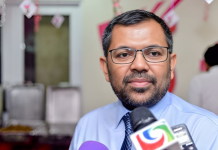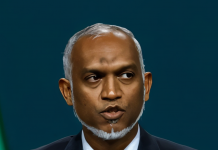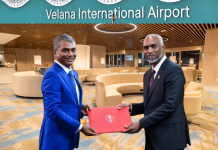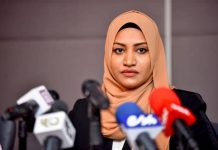The Maldives government, on October 10, 2019, “temporarily” shut down the Maldivian Democracy Network (MDN), the country’s leading human rights organization, Human Rights Watch said today.
The government of President Ibraham Solih should immediately reverse its decision, which came amid serious threats against the organization for its report on rising radicalization in the Maldives. The authorities should investigate Islamist groups responsible for inciting violence against rights groups in the Maldives.
“President Solih fulfilled his campaign promise to abolish laws curtailing free expression, only to resort to the same tricks against the Maldivian Democracy Network,” said Patricia Gossman, Asia associate director at Human Rights Watch. “By shutting down the MDN, President Solih is feeding a frenzy of threats and incitement by Islamist groups.”
The government, in its decision, cited the International Covenant on Civil and Political Rights (ICCPR), which the Maldives has ratified, to justify shutting down the organization to maintain “public order and communal harmony.” However, the ICCPR affirms that the right of freedom of expression is subject to restrictions only as provided by law and as are strictly necessary and proportionate to achieve legitimate aims.
MDN has long faced threats and attacks for opposing violence by Islamist groups in the Maldives. The recent campaign against the organization began after the government introduced new legislation on terrorism that religious extremists and criminal gangs affiliated with powerful opposition politicians feared would be used against them. Several hundred Maldivians have fought abroad with the Islamic State (also known as ISIS), which some clerics and Islamist activists in the Maldives have promoted.
Critics of the new law attacked MDN for a 2015 report on radicalization, claiming that the group had insulted Islam. The Islamic Affairs Ministry accused MDN of using foreign funds to motivate Maldivians against Islam, and promised strict action. The organization removed the report from its website and issued an apology.
The authorities in the Maldives should stop pressuring civil society organizations to censor themselves and should demonstrate their commitment to freedom of expression, Human Rights Watch said.
The United Nations Human Rights Committee, the independent expert committee that monitors compliance with the ICCPR, has stated in a general comment that human rights organizations are “frequently subjected to … threats, intimidation and attacks because of their activities,” and that governments “should put in place effective measures to protect against attacks aimed at silencing those exercising their right to freedom of expression. [The ICCPR] may never be invoked as a justification for the muzzling of any advocacy of multi-party democracy, democratic tenets and human rights.” All such attacks should be “vigorously investigated in a timely fashion, and the perpetrators prosecuted.”
The Solih government has taken inadequate steps to bring to justice those responsible for past violence against social activists and critics of the government, Human Rights Watch said. The ongoing investigation into the 2017 murder of a blogger, Yameen Rasheed, and the enforced disappearance of a journalist, Ahmed Rilwan Abdulla, in 2014 identified Islamist gang leaders as part of a conspiracy to target activists and government critics.
In September 2019, a presidential inquiry commission reported that a local extremist group was responsible in both cases. Both men had reported receiving numerous threats that police failed to investigate. Since the report was released, there have been no arrests in the Rilwan case. The prosecution of six suspects accused of killing Yameen Rasheed has been delayed repeatedly.
The Maldives government should also do more to address the growing problem of online hate speech by punishing those who incite violence and by countering religious intolerance. The government should not tolerate officials who engage in or support hate speech.
“Maldives authorities should stop harassing human rights and other civil society organizations while ignoring violent threats from powerful Islamist groups,” Gossman said. “Instead of trying to appease Islamist extremists, the authorities should robustly prosecute groups inciting violence.”
Source– Human Rights Group Shut Down


















